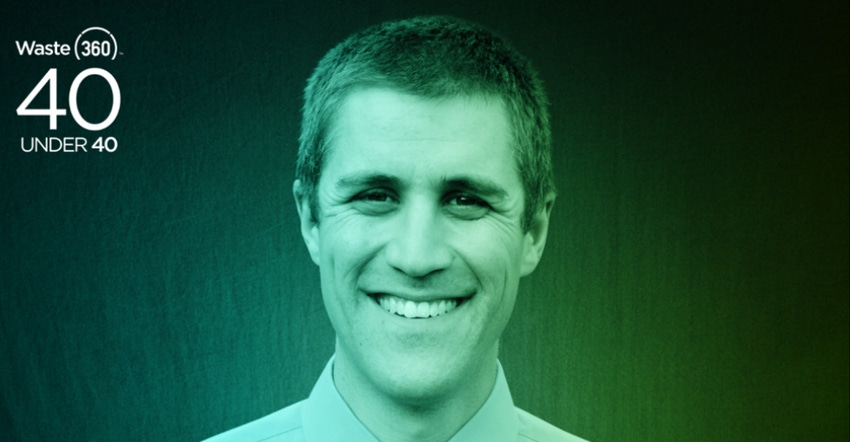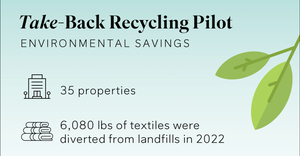Since launching his career in the waste and recycling industry in 2005, Jeremy Labbe has done a substantial amount of work in changing the public perception of landfills. Now a general manager with Casella Waste Systems in Vermont, Labbe is a firm believer in building meaningful relationships between landfill sites and the communities of which they are a part.

Since launching his career in the waste and recycling industry in 2005, Jeremy Labbe has done a substantial amount of work in changing the public perception of landfills.
Now a general manager with Casella Waste Systems in Vermont, Labbe is a firm believer in building meaningful relationships between landfill sites and the communities of which they are a part.
While working on several different enrichment projects throughout his career, he has been able to maintain landfill functionality while also creating public spaces for education, recreation, and community enhancement.
This Waste360 40 Under 40 award winner shares with us what makes these projects so important in this Q&A.
Waste360: Can you tell me about the journey you’ve gone on to get where you are now?
Labbe: I started with Casella around 2005 when I was a new graduate student at the University of Maine in the engineering program. Casella needed technicians to do some environmental monitoring, and one of the engineers that worked for them as a consultant reached out to our engineering department saying, “hey, we need some techs. Is there anybody that would wanna do some part-time work on the side?”
Because I was a grad school kid, and I was pretty poor, I took any offer I got when I was given a chance to make a little extra money. Initially, three of us took the offer and they had us working mostly in gas well tubing.
That's how I started working with Casella. I wasn’t even working with them actually, I was working under them with a consultant so to speak.
Then Casella caught wind of it and when they were looking to hire, they actually called us. They called me back personally and said “hey, do you wanna come in as an intern?” And I started as an intern during my last year of grad school.
Once I finished my final year of grad school, they offered me a full-time position as an environmental technician, so I was doing environmental monitoring; whether it was the gas or reporting for waste.
When I first started full-time, they had just started a gas energy facility—it was under construction—and also a gas treatment facility for hydrogen sulfide, which at the time no one really knew what it was. They had me working on that project and turns out we were the Guinea pigs so I really cut my teeth trying to figure out how to make that thing run. There were a bunch of us who worked really hard to get it successfully operating.
I was a technician for like 5 years and then the role of environment manager opened up and they offered it to me. That position was environmental manager, which was overseeing two of the only two landfills we had in the state of Maine.
About six years after that, this position as general manager opened up and they offered it to me, which meant I had to move to Vermont, so I relocated my family and I, and this will be my fourth year here.
Waste360: Can you tell me your job title and a little about the work you are doing now?
Labbe: As a facility manager, you’re responsible for the entire facility staff and budget compliance.
Casella makes ownership of what you do important. They make it important that you are engaged; you're not just a transactional employee. You are an employee that really cares.
For me, it feels like this is a site that I have a responsibility for watching over. You’ll hear people, myself included, say “my site,” and that’s because people take ownership of what they do. It's nice because people really care.
I am responsible for making sure my guys and my girls—my entire team—has the resources they need to get the job done right, all while making sure that we're staying on track financially, remaining in compliance with safety regulations, and meeting, or hopefully exceeding, all of our expectations and goals every single year.
Waste360: Can you tell me a bit about the maple sugaring operation at the Juniper Ridge Landfill (JRL) and the community orchard and beehive at NEWSVT?
Labbe: Yes. One of the things that we're trying to do as a company is helping people understand that we also care about the environment, as much as, if not more than, they do. We have a lot of green space around our landfill sites that are not used for landfill or industrial activity, and we're always looking for ways to utilize that to benefit the public and create some form of public outreach.
So, in Maine, we thought “what if we took some of the landfill gas and burned it in an old-fashioned Maple syrup evaporator?” We decided to tap some of the maple trees on our site and make some maple syrup out of it.
We’ve developed our own sugar house over there with a pipe that pumps the gas we produce. It is basically compressed natural gas derived from landfill gas that is completely clean. We built our evaporators to run specifically on landfill gas.
We take sap from the maple trees around our site and we boil it down to make Maple syrup that we give away. We just give it away. We don't sell it or anything like that. It's a big hit.
It was a project that engaged the whole site; a lot of people gave up their extra time outside of work to make it work. A lot of us went out of our way to make sure everything worked even though it wasn't our job requirement to do so, but we were dedicated. We wanted to see it succeed.
When I moved to Vermont, we decided to do something a little different. Here, it seems like everyone makes Maple syrup. In Northern Vermont, if you make maple syrup, you're like every other person because there are a lot of people that do it. So here we decided to build a community garden where we put in apple trees, raspberry bushes, blueberry plants, and all kinds of natives like cherries and currents and elderberries. We also put in some beehives. The neighbors and anybody that wants to can come to pick raspberries during the raspberry season, or pick fresh apples when its apple season. Hopefully, if we have a good year and get good honey, we can give that away as well.
The bees are also a twofold thing, promoting the fact that our sites are trying to sustainably plant varieties of flowers that promote bee and butterfly activity—ones that really help sustain pollinators. It is impossible to grow any fruits and vegetables without pollination, so those creatures are incredibly important to our food chain. We want to support them so we plant acres and acres of pollinator variety mixes.
We actually added 100 beehives from a third party this year as well. There's a big beekeeper around our neck of the woods here in Vermont who travels with his beehives across the country to help pollinate, you know, whether it's oranges or almonds or blueberries. He's traveling with like 1200 hives, and in the summertime in Vermont, he's always looking for places where he can put his bees so that he can create some honey to create some revenue. So we said, why don't you take 100 hives and put them right on our site because we’ve got plenty of pollinator habitat for them, and they've done great. They're right across the road from our office and we're hoping to get a big honey harvest out of them.
Waste360: What do you feel is the value of implementing projects like these into your work with the landfills?
Labbe: Traditionally, landfills have a lot of real estates and unfortunately, just like any industrial facility, people have that “oh my goodness, how come it's in my backyard” feeling, right? We're attempting to change that by understanding that landfills are assets for the company, as well as the towns they’re in because they provide revenue and are a facility that everybody needs.
Landfills provide a public health and safety benefit for the entire area that collects waste because they're needed. They're desperately needed in order to maintain clean streets and public safety. I mean, just think of how far we've come by establishing reliable landfills.
In addition to that, these projects help people understand we are going far above and beyond, trying to responsibly and sustainably use the land that we have in whatever ways we possibly can. Across the different sites owned by Casella, we're always looking for opportunities like that to help with public perception of what a site is.
We just want to help the community and help nature as a whole. It's not a company policy, it's more of a goal. We want to become the kind of company that exemplifies how to operate an industrial facility in harmony with the environment around it.
Waste360: What do you believe is the importance of trying new things and getting creative in this industry?
Labbe: As an industry, we need to prove to our neighbors that we are benefitting the places we are located and are operating sustainably and responsibly.
These kinds of projects help build positive relationships with our neighbors, even if they are not our regulators. When the neighbors are commenting positively on things it means a lot, because today, not just in our industry but in general, it is uncommon for people to say anything unless they're complaining. And so the only people you tend to hear from are the people who are against something, not the people who are for something. It makes it that more special when you hear from people “we wanna have this facility continue to be here because of XY and Z.”
Whether it's these projects or the fact that we are doing a good job with odor, doing a good job with the cover, doing a good job with traffic, it is really important to us. You can't run a sloppy site that doesn't care. It doesn't fly. These need to be really well managed and taken care of facilities.
Waste360: Do you have any interesting ideas for future landfill enrichments like the ones previously mentioned?
Labbe: Yeah. There are all kinds of ideas out there. I'd like to use some of our nice green space to build a couple of softball fields for the local community to have somewhere to do those kinds of activities. It’s a big undertaking to build a nice softball field.
A lot of these parks are already built on old landfills. Our current softball field in the city is actually an old offline landfill from the early to mid-1900s. It's one of the only few really flat spots in Vermont in our area, so they make great spots to build parks and softball fields on top of.
This is a thing that happens all over and people just don't pay attention to it. It's really kind of cool.
I think something like that would be kind of cool. Anything that benefits the public and gets them out there enjoying the outside and also seeing what we do. That’s important to us—it’s something we strive for.
We could do something like that adjacent to a facility like a landfill and prove that it's not an eyesore or an odor issue. It could prove you can be right there next to it and not smell it, and not really see it either.
If I ever had an opportunity to build a softball field or something that would provide outdoor activity for people, whether it's that or like walking trails or anything else, I would. I want to work on something where people can get active and enjoy the outdoors with their families. That would be my next project.
Waste360: Is there anything else you’d like to add?
Labbe: I guess it goes without saying but when it comes to the 40 under 40 awards, some winners are very self-made people, but in my case, it is only with help from the people around me that I was considered for this award. It's not just one man standing out, it's my crew here that runs the show and makes things look good.
They need to get the credit sometimes. I am the one who got the award for all these successes, but behind the scenes, these people have done a tremendous amount of work alongside me. There are people who are here day in and day out dealing with trash every day and everything else that happens in our industry. I think they are really the ones who deserve the credit.
About the Author(s)
You May Also Like




